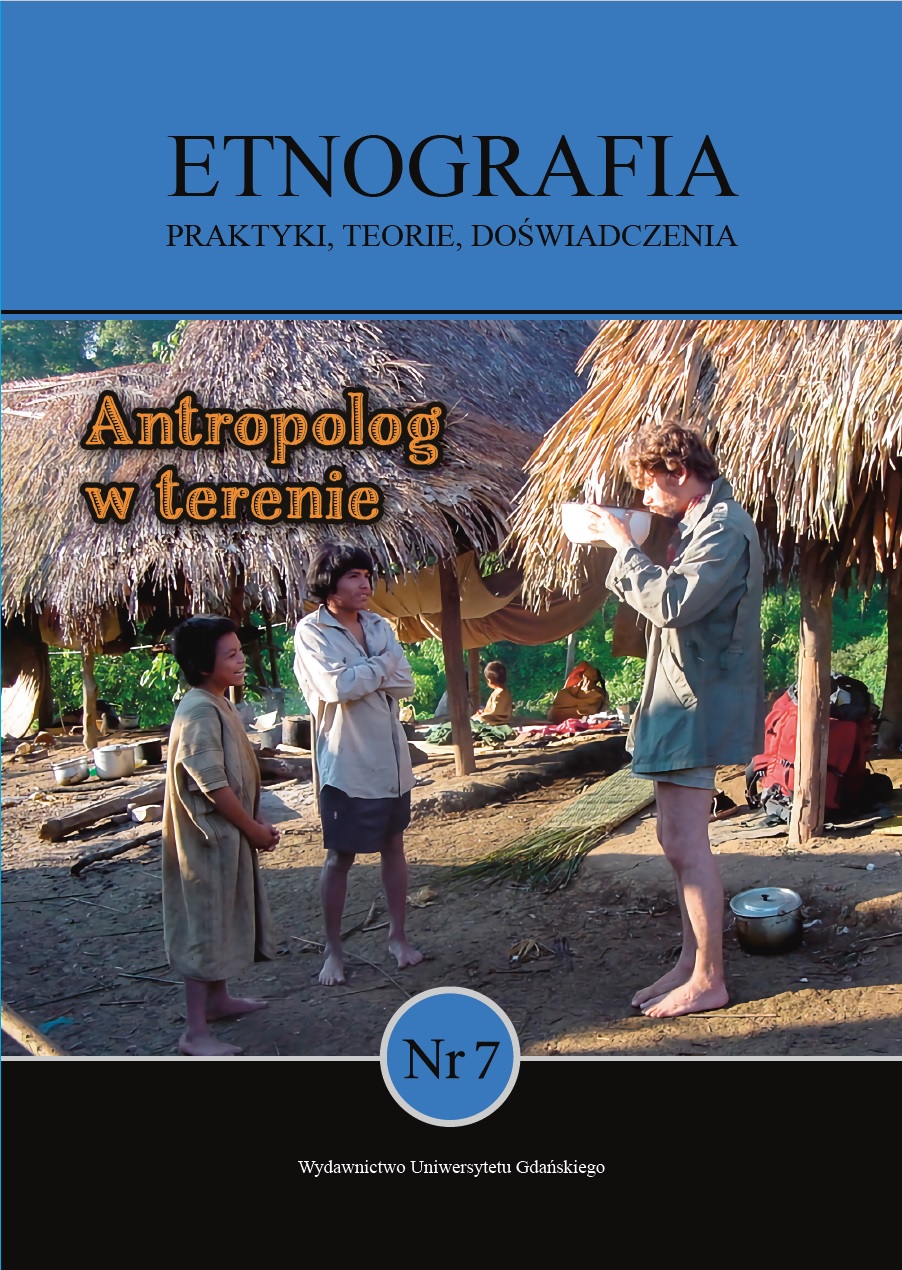Ciało i naród. O doświadczaniu uczestnictwa i pozycjonowaniu antropologa w terenie
DOI:
https://doi.org/10.26881/etno.2021.7.14Słowa kluczowe:
nativeness, strangeness, ethnicity, body, positioning, CanadaAbstrakt
This article offers reflections arising from my three-year field research with the Ukrainian diaspora in two Canadian cities. Drawing on this field experience, I present the body as a research tool and the impact of work performed by the ethnographer’s body. I discuss my multi-sensory field experience and the experience of participation, which are inter- twined with the increasingly important issue of ethnographer’s positionality in the field, and – in my view – the utopian freedom to choose or negotiate professional identities. My considerations are embedded within the insider-outsider dialectics (not opposition) and point to the contextual “nativeness” and “strangeness” of the researcher. I claim that the act of attribution of social class and ethnicity by our field partners influences our field- work and may have long-lasting consequences in the ethnographer’s later life, including their private life. I also discuss the fluidity and contextuality of a researcher’s familiarity with their field, including research situations where fieldwork is done with “one’s own people” or in cooperation with “one’s own people”, i.e. when and how familiarity is trans- formed into strangeness.
Downloads
Bibliografia
Amelina, A., Faist, T. (2012). De-naturalizing the national in research methodologies: key concepts of transnational studies in migration. Ethnic and Racial Studies, 35, 1–18.
Bielenin-Lenczowska, K. (2011). Gdzie jest mój teren i Kim w nim jestem? Kilka pytań w związku z terenem, wiedzą i etyką antropologa. W: T. Buliński, M. Kairski (red.), Teren w antropologii. Praktyka badawcza we współczesnej antropologii kulturowej (s. 151–168). Poznań: Wydawnictwo Naukowe UAM.
Breckner, R. (2012). Podejścia porównawcze zorientowane na przypadki: perspektywa biograficzna jako możliwość i wyzwanie w badaniach migracji. Przeł. P. Polak. W: K. Kaźmierska (red.), Metoda biograficzna w socjologii. Antologia tekstów (s. 617–658). Kraków: Wydawnictwo NOMOS.
Brubaker, R. (2002). Ethnicity without groups. European Journal of Ethnicity, 43, 2, 163–89. Buliński, T. (2019). Informator, rozmówca, wspólnik. Obrazy relacji Antropologa z Innym. Prace Etnograficzne, 47, 1, 1–16.
Carling, J., Erdal, M.B., Ezzati, R. (2014). Beyond the insider-outsider divide in migration research. Migration Studies, 2(1), 36–54.
Chiseri-Strater, E. (1996). Turning in upon ourselves: Positionality, subjectivity and reflexivity in casestudy and ethnographic research. W: P. Mortensen, G. Kirsch (ed.), Ethics and Representation in Qualitative Studies of Literacy (s. 115–133). Urbana, Ill.: National Council of Teachers of English.
Csordas, T. (1990). Embodiment as a paradigm for anthropology. Ethos, 18, 1, 5–47.
De Certeau, M. (2008). Wynaleźć codzienność: sztuki działania. Przeł. K. Thiel-Jańczuk. Kraków: Wydawnictwo Uniwersytetu Jagiellońskiego.
Evans-Pritchard, E.E. (1977). The Nuer: a description of the modes of livelihood and political institutions of a Nilotic people. New York: Oxford University Press.
Fine, G.A. (2010). Dziesięć kłamstw etnografii – dylematy etyczne w terenie. W: K. Kaniow- ska, N. Modnicka (red.), Etyczne problemy badań antropologicznych. Wrocław-Łódź: Polskie Towarzystwo Ludoznawcze, 87–112.
Ganguly, T. (2016). The politics of location: being a native anthropologist among western interlocutors in India. A Journal of Social Anthropology and Cultural Studies, 13, 2, 210–231. Glick Schiller, N., Çağlar, A. (2013). Locating migrant pathways of economic emplacement: Thinking beyond the ethnic lens. Ethnicities, 13(4), 494–514.
Glick Schiller, N., Çağlar, A., Guldbrandsen, T.C. (2006). Beyond the ethniclens: Locality, globality, and born-againin corporation. American Ethnologist, 33(4), 612–633.
Hammersley, M., Atkinson, P. (2000). Metody badań terenowych. Poznań: Wydawnictwo Zysk i S-ka.
Hastrup, K. (2008). Droga do antropologii. Między doświadczeniem a teorią. Przeł. E. Klekot. Kraków: Wydawnictwo Uniwersytetu Jagiellońskiego.
Hastrup, K. (2014). Poetyka miejsca: bezczasowa topografia Thule. W: M. Buchowski, A. Bentkowski (red.), Colloquia Anthropologica. Issues in Contemporary Social Anthropology / Problemy współczesnej antropologii społecznej. Poznań: Nauka i Innowacje, 39–58. Hastrup, K. (2018). Świadomość mięśniowa. Wytwarzanie wiedzy w Arktyce. Teksty Drugie, 1, 127–153.
Herzfeld, M. (2007). Zażyłość kulturowa. Poetyka społeczna w państwie narodowym. Przeł. M. Buchowski. Kraków: Wydawnictwo Uniwersytetu Jagiellońskiego.
Herzfeld, M. (2009). The cultural politics of gesture. Reflections on the embodiment of ethnographic practice. Ethnography, 10, 131–152.
Irving, A. (2018). Podróże dalekie i bliskie. Przeł. S. Sikora. Teksty Drugie, 1, 173–200. Kłoskowska, A. (1996). Kultury narodowe u korzeni. Warszawa: Wydawnictwo Naukowe PWN.
Majbroda, K. (2016). Od konwencji narracyjnej do metody. Praktykowanie antropologii społeczno-kulturowej po zwrocie afektywnym. Zeszyty Etnologii Wrocławskiej, 1(24), s. 65–84.
Moroşanu, L. (2015). Researching Coethnic Migrants: Privileges and Puzzles of „Insiderness”. Forum Qualitative Sozialforschung / Forum: Qualitative Social Research, 16 (2). http:// www.qualitative-research.net/index.php/fqs/article/view/2371.
Narayan, K. (1993). How native is a ‘native’ anthropologist? American Anthropologist, 95(3), 671–686.
Okely, J. (2007). Fieldwork Embodied. Sociological Review, 55, 1, s. 65–79.
Park, J. (1992). Research Partnerships: A discussion paper based on case studies from ‘The place of Alcohol in the lives of New Zealand women’ project. Women’s Studies International Forum, 15(5–6): 581–91.
Pink, S. (2009). Doing Sensory Ethnography. Thousand Oaks: SAGE Publ.
Rakowski, T. (2018). Etnografia przedtekstowa. Fenomenologiczne korzenie interpretacji antropologicznej. Teksty Drugie, 1, 16–39.
Ryan, L. (2015). „Inside” and „Outside” of Whator Where? Researching Migration Through Multi-Positionalities. Forum Qualitative Sozialforschung / Forum: Qualitative Social Research 16, (2); http://www.qualitative-research.net/index.php/fqs/article/view/2333/3785.
Samudra, J.K. (2008). Memory in ourbody: Thick participation and the translation of kinesthetic experience. American Ethnologist, 35 (4), 665–681.
Trzeszczyńska, P. (2019). Diaspora – pamięć – miejsca. Ukraińcy z Polski z lat 80. XX w. w Kanadzie. Studium etnograficzne. Kraków: Wydawnictwo Uniwersytetu Jagiellońskiego. Tsuda, T. (1998). Ethnicity and the anthropologist: Negotiating identities in the field. Anthropological Quarterly, 71(3), 107–124.
Voloder, L. (2014). Introduction: Insiderness in migration and mobility research: Conceptual considerations. W: L. Voloder, L. Kirpitchenko (ed.), Insider Research on Migration and Mobility: International Perspectives on Researcher Positioning (s. 1–17). London-New York: Routledge.
Pobrania
Opublikowane
Wersje
- 2023-10-17 - (2)
- 2021-12-23 - (1)
Jak cytować
Numer
Dział
Licencja
Czasopismo wydawane jest na licencji Creative Commons Uznanie autorstwa-Na tych samych warunkach 4.0 Międzynarodowe.

 Uniwersyteckie Czasopisma Naukowe
Uniwersyteckie Czasopisma Naukowe








